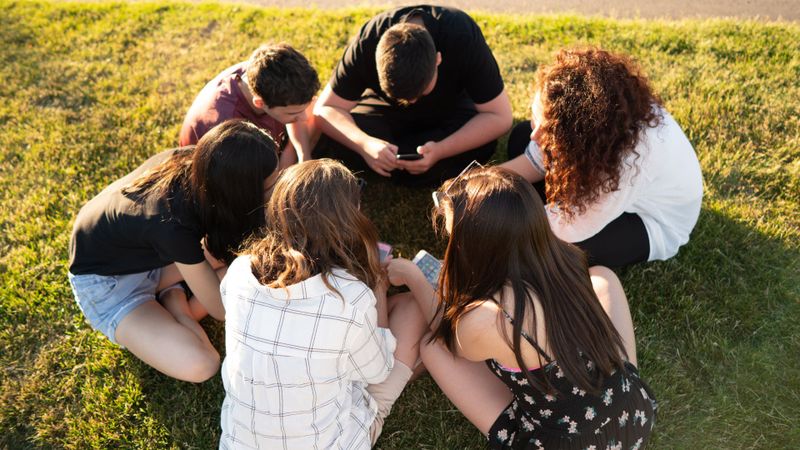DIGITAL PARENTING
A Complete Guide to Giving Your Kid Their First Phone
Getting your kid their first smartphone is a big deal. If you are considering it, you're probably wondering about the pros and cons of your kid having their own phone, whether they are ready for it and how you should go about it. No worries, we've got you covered. Here's our complete guide to walk you through the process so you're well prepared.

Should You Get Your Kid a Smartphone?
There are some pros and cons you should consider before giving your kid a phone. We've listed some of them to help you make a decision that's best for you and your kid.
5 Pros of Your Kid Owning Their Own Phone
1. Smartphones are a means to communicate.
With the emergence of digital technology, the way we communicate and stay connected with friends and family has changed drastically. This is even more true for kids. They use social media, texting apps and games to stay in touch with their peers. Without their own phone, your kid may feel left out.
2. Technology can have a positive impact on your kid's education.
Laptops, tablets and other digital devices are useful tools for kids at school. At a certain age, a smartphone may be very helpful for your kid to complete their schoolwork. There are also great apps for kids that help them learn languages, math, etc.
3. Smartphones provide safety.
Smartphones can add convenience and flexibility to your family life as you can always reach each other. For example, if your kid needs to be picked up from school unexpectedly early, they can simply give you a call. In a survey conducted by the Digital Wellness Lab, 86% of parents said that the most important reason for getting their kids a phone is to keep them safe and stay in touch with them.
4. It helps your kid develop good technology habits.
Your kid is most likely already exposed to some screen time - and if you deny them the use of technology, it could easily backfire. They might slide into social media completely unprepared. Instead, by letting your kid have their own phone, you can help them learn to navigate the digital world safely and learn good habits from the start.
5. Smartphones foster a sense of responsibility.
Cellphones aren't exactly cheap. Owning a phone can help your kid develop skills like responsibility and accountability. Make sure your kid understands the consequences of damaging or losing their phone.
5 Cons of Your Kid Owning Their Own Phone
1. Your kid may become socially isolated.
Smartphones allow us to stay in touch with our family and friends without having to leave the house. This can cause your kid to become socially isolated. And when your kid leaves the house to meet up with their friends, they may spend time together physically but just stare at their phones without talking to each other.

Some teens just meet up to look at their phones in silence and don't socialize with each other.
2. Your kid may be exposed to inappropriate content.
If your kid is allowed to use their smartphone unmonitored, they could easily come across explicit content like nudity or violence. This exposure may have lasting negative effects on a kid.
3. Smartphones are distracting.
You've probably noticed this yourself: A quick glance at your phone and it takes a long time until you're able to focus on your task again. And obviously, it's very tempting for a kid to play with their phone instead of studying.
4. There aren't just nice people online.
The online world can be a cruel place, as it's still considered lawless, where you seemingly can say and do whatever you want without facing any consequences. That's one of the reasons why smartphones have become a tool for cyberbullying or sexual harassment. Uncontrolled smartphone use can lead to kids being exposed to predators.
5. Smartphones can negatively impact your kid’s health.
Too much screen time can overstimulate your kid and potentially lead to a technology addiction that could cause depression and anxiety. A study found that excessive screen time can alter a kid's developing brain.
What Age Should You Get a Kid Their First Phone?
Kids are getting their first smartphones younger than ever. And there are valid reasons for it: The pandemic has led to a significant shift in the education system. Lockdowns have made it important for kids to use technology, and it's become virtually impossible to shield them from the digital world.
There is no universal recommendation for the perfect age to get your kid a cell phone. Experts suggest that an appropriate age is anywhere between 10 to 14. In fact, a survey by the Digital Wellness Lab found that, on average, kids get a phone at age 10. However, in some cases, it may make sense to give your kid a phone earlier, such as if they have to commute alone. Since kids are exposed to screens at an early age anyway, you could consider giving your kid their first phone between 10 to 12 as kids at this age are still very dependent on their parents and more likely to accept parental supervision.
Regardless of your kid's age, you should ask yourself a more important question:
Is my kid ready to have their first phone?
Here are some questions to help you figure out if your kid's ready for a cell phone:
- Do they stick to the screen time limits for technologies they already use, such as video games, tablets or TVs?
- Do you think your kid will agree to rules for using their own smartphone?
- Do they generally come to you with problems or when they think they're in trouble?
- Are they doing chores around the house?
- Are they able to handle conflicts?
- Do they deal with situations without any impulsivity?
If you answered "no" to most of these questions, you may want to hold off on the idea of giving them a phone for a little longer and keep working on manifesting existing rules.
What Can You Do Before Giving Your Kid a Phone?
Talk to your kid. This one's really important. Involve your kid in the process of getting a phone for them and have regular open conversations with them about their phone usage. Make sure your kid understands that the goal isn't to monitor them, but to give them the skills they need to become a good digital citizen who can use technology responsibly and wisely.

Getting your kid ready for the digital world requires regular conversations.
Choose the right phone. This process can require quite some research. In general, we recommend buying your kid a smartphone that runs on the same system as your own so you don't have to wrap your head around a new operating system. If you are thinking about getting an iPhone but don't want to break the bank, go for the iPhone SE. For Android, the Samsung Galaxy A11 is a popular and affordable choice. Regardless of the system, refurbished phones are a great option to save you money - and you'd do something good for the planet. Tip: If you don't think your kid's ready for a smartphone, how about a simple, "old-school" cell phone without access to the internet?
Install apps. Set up your kid's phone and download age-appropriate apps, as well as the must haves for your family. Opt for educational apps and take a close look at each app's age rating. For example, social media apps usually have an age rating of 13+. If you're unsure about an app, use our Smart App Check feature for age-based ratings and reviews.
Set ground rules and talk about online safety. If you talk to your kid about ground rules before giving them their own phone, you're likely to avoid a lot more discussion. Discuss appropriate rules for daily screen time, bedtime, school rules, etc. Make sure to also talk about online risks before your kid explores the digital world. You may have to do some homework yourself - our guide is a good starting point to learn about things to watch out for. Address issues like online etiquette, sharing information, pornography, risk of predators, etc. Talk openly about the risks so your kid knows how to handle these situations - or knows that they can always talk to you if anything they encountered online made them feel uncomfortable.
Our Ohana Family Tech Agreement is the perfect tool to start this conversation with your family. Download your free template here:
Why Should You Set Up Parental Controls?
Limit screen time. Too much screen time isn't good for anyone, especially not your kid. Create a healthy digital routine and limit your kid's daily screen time. Ohana includes science-based screen time recommendations based on your kid's age.
Block inappropriate content. There are plenty of apps and websites your kid shouldn't be exposed to. Ohana automatically blocks hundreds of websites that contain profanity or explicit content. You can also auto-block individual apps and websites - or prevent your kid from downloading age-inappropriate apps.
Get reports on your kid's phone usage. Try to better understand your kid's online behavior. What apps and websites do they use most often? If you find that your kid is spending too much time playing a mindless game, try to gradually incorporate more useful and educational apps. Make the most of your kid's screen time.
Request location updates. Wouldn't you have peace of mind knowing if your kid arrived safely at school or a friend's house? With Ohana, you can set up geofences to be automatically notified when your kid arrives or leaves a specific location. Or, request your kid's location on demand.
Stay up-to-date about the digital world. You can't teach your kid how to ride a bike if you can't do it yourself. So how are you supposed to guide your kid through the digital world if you know nothing about it? Do your homework and regularly educate yourself about the benefits and risks of the digital world. In our guide, we cover a variety of topics about digital parenting.
After explaining the benefits of using a parental control solution like Ohana, we want to point out that there's no app to raise your kid for you. Again, this won't be a one-time conversation. Have regular chats about the digital world and their phone usage - and make sure to reassess the rules you've agreed on as they grow and show more maturity. And don't forget to keep telling them to come to you if something bad happens. You've got this.